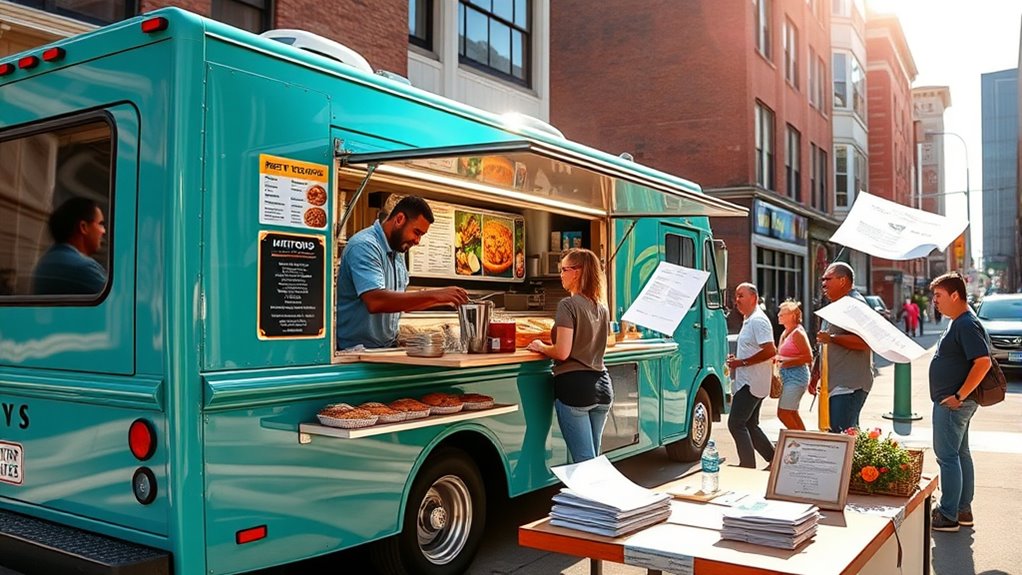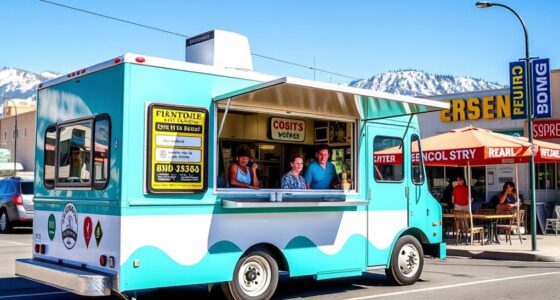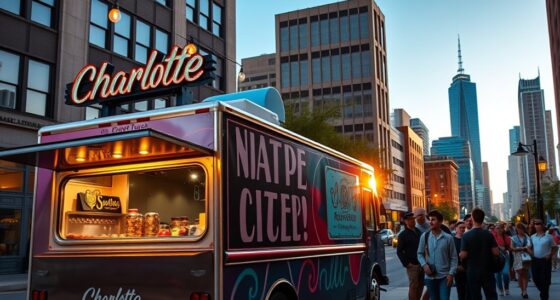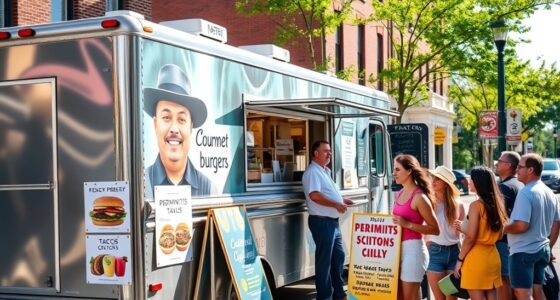To open a food truck in Hartford, CT, you need to secure permits like a mobile food vendor license, health inspection certification, and possibly parking permits. Budget around $50,000 to $250,000 for startup costs, including permits, equipment, and inventory. Focus on approved locations such as downtown or near UConn Law, and develop a menu that’s simple, safe, and locally inspired. Effective marketing and community engagement are key, so exploring detailed steps can set you on the right path.
Key Takeaways
- Obtain necessary permits, licenses, and pass health inspections to operate legally in Hartford, including mobile food vendor and health certificates.
- Budget for startup costs ranging from $50,000 to over $250,000, covering permits, equipment, inventory, insurance, and ongoing expenses.
- Choose high-foot-traffic, approved locations like downtown, Chatham St., and near UConn Law, while participating in local events and festivals.
- Develop a safe, appealing menu with local ingredients, maintaining proper food safety practices and compliance with health standards.
- Promote your food truck via social media, community participation, collaborations, and branded signage to build visibility and customer loyalty.
Navigating Permits and Licensing Procedures

Navigating the permits and licensing procedures for operating a food truck in Hartford requires you to complete several essential steps. First, you must obtain a Mobile Food Vendor License from the city to operate legally. You’ll also need a valid business license as part of your application process. Submit a mobile food vending application with supporting documents like food safety certification and health inspection certificates. Additionally, acquire a food service license to serve hot or cold food, adhering to Hartford ordinances. You’ll need to pass health inspections conducted by Hartford’s Health Department or the Connecticut Department of Public Health. During inspections, ensure your truck displays all permits and certificates visibly. Completing these steps ensures you’re compliant with local regulations and ready to serve safely and legally in Hartford. Understanding food safety standards is essential for passing inspections and maintaining a reputable operation.
Understanding Costs and Fee Structures

Understanding the costs and fee structures involved in opening a food truck in Hartford is essential for planning a successful venture. Startup expenses can range from $50,000 to over $250,000, depending on truck choice and equipment. Expect to pay between $1,864 for permits, licenses, and health inspections, plus initial inventory costs around $2,300 to $3,300. Insurance premiums require at least $2 million coverage, adding to ongoing expenses. Monthly operating costs include truck leases ($5,500–$10,500), fuel, maintenance, and restocking supplies. Additional fees may apply for parking permits, commissary rentals, and event participation. Hartford’s specific fee structures for licenses, inspections, and location surcharges influence your overall costs. Carefully budgeting for these expenses ensures you’re financially prepared to launch and sustain your food truck business. Additionally, understanding local regulations and zoning requirements is crucial to ensure your operation complies with city ordinances and avoids potential penalties.
Choosing Approved Operating Locations
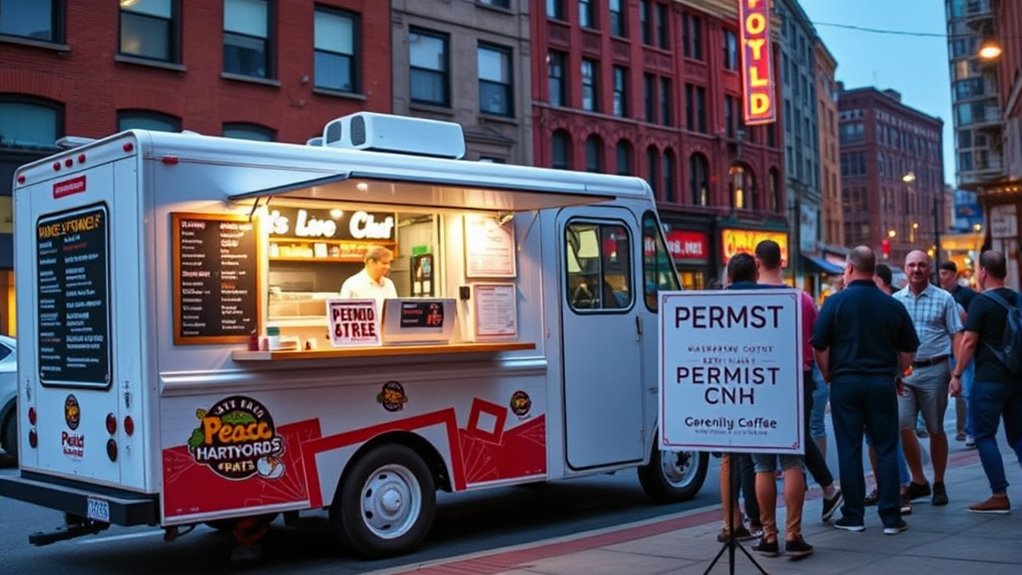
Are you aware of where you can legally park and operate your food truck in Hartford? You must stick to designated on-street areas approved by the city, which include busy corridors like Chatham St., Hebron St., Asylum Ave., West End near UConn Law, and Kenyon St. Operating hours are regulated, with some zones allowing vending until 9 pm or dusk, depending on the location and permit. The city reviews and updates approved zones regularly for safety and order. You can also operate on roads within city parks until dusk, but need permission from authorities. Some prime spots are assigned through a lottery system, offering extra hours. Always check the latest maps and regulations to ensure your chosen location is authorized and compliant. Additionally, it’s important to stay informed about any temporary restrictions or special events that might affect your operating area.
Meeting Health and Safety Standards
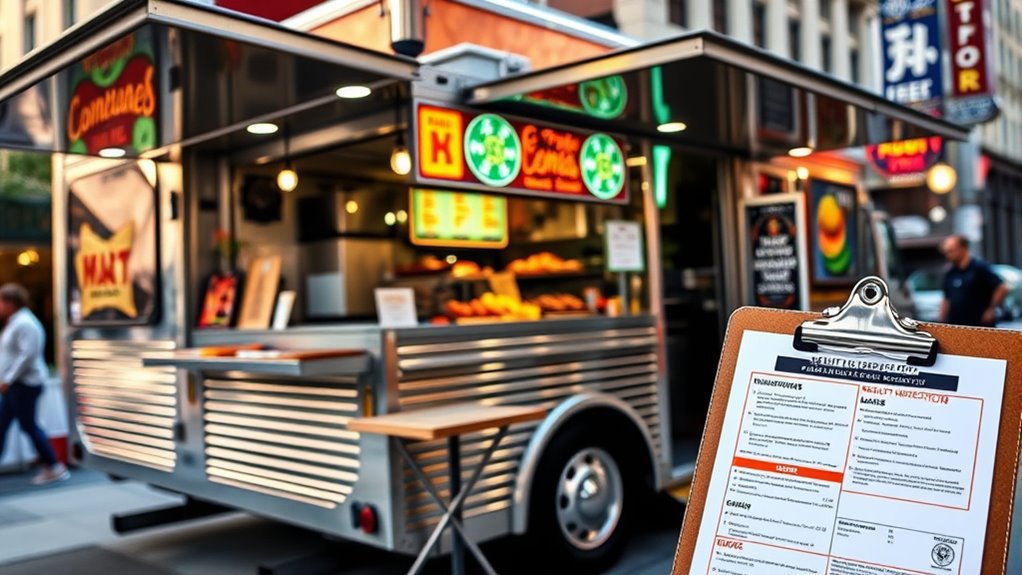
To operate your food truck legally and safely in Hartford, you must meet strict health and safety standards set by local and state authorities. First, your truck needs to pass a health inspection by the Hartford Health Department or Connecticut Department of Public Health, confirming compliance with food safety, storage, and sanitation rules. You’re required to complete a certified food safety course and provide proof of certification for licensing. Your truck must operate from an approved commissary kitchen, have proper refrigeration, cooking, and sanitation equipment, and display all permits visibly. You’ll also need to adhere to waste disposal standards, maintain clean food contact surfaces, and post signage about handwashing and allergens. Regular inspections ensure your truck remains compliant, safeguarding both your business and your customers. Supported by current regulations, staying up-to-date with any changes is essential for ongoing compliance and avoiding penalties. Additionally, understanding food safety standards and maintaining thorough documentation can help streamline the inspection process.
Developing a Compliant Menu and Food Offerings
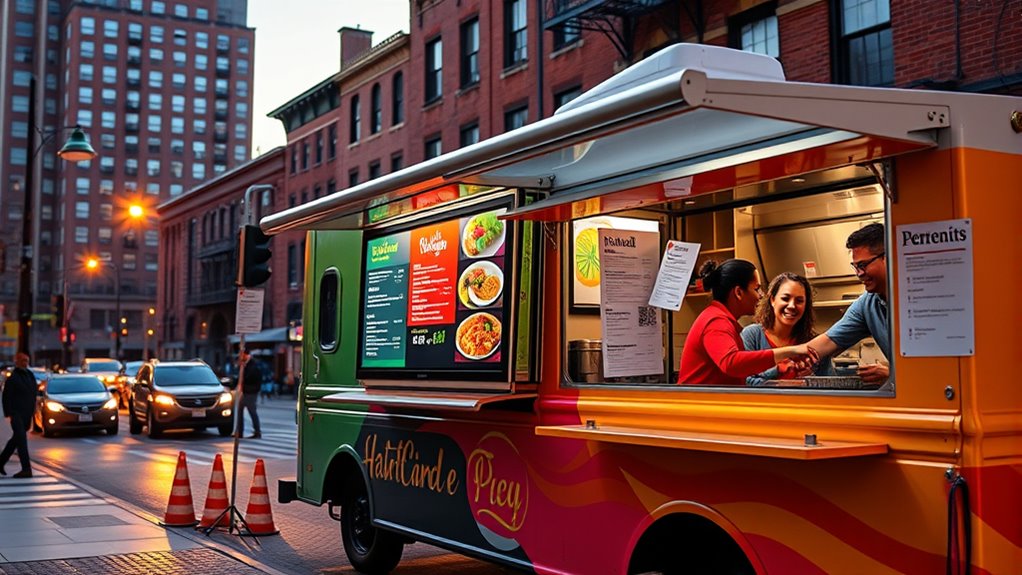
When developing your menu, you need to guarantee all items meet local health and safety standards, especially if serving potentially hazardous foods. Using locally sourced ingredients can help you maintain quality and comply with regulations, but you’ll also need proper documentation for certain items. Keep your menu simple and focused to make safe preparation, storage, and service easier within your food truck’s limited space. Additionally, understanding food safety regulations is crucial to prevent contamination and ensure compliance with health codes.
Menu Item Safety Standards
Developing a compliant menu for your Hartford food truck requires careful attention to safety standards that protect your customers and meet local regulations. You must ensure all potentially hazardous foods are stored, prepared, and held at safe temperatures—poultry at 165°F, ground meats at 160°F, eggs at 160°F. Strict hand hygiene protocols are essential; staff must wash hands at designated stations after glove removal or contamination. Use separate utensils and cutting boards to prevent cross-contamination. Clearly list menu items and include allergen info to comply with regulations. Your truck needs certified hand wash stations with running water, soap, and towels, plus refrigeration below 41°F. Regularly monitor temperatures and train staff on proper food handling to maintain safety and prevent foodborne illnesses. Incorporating emotional intelligence in staff training can improve teamwork and compliance with safety practices.
Locally Sourced Ingredients
Incorporating locally sourced ingredients into your Hartford food truck menu not only boosts freshness and flavor but also aligns with community values and sustainability efforts. You can partner with local farms, co-ops, and markets to access seasonal produce, dairy, meats, and artisanal products. Prioritize sourcing from certified organic and sustainable farms to ensure high-quality ingredients. Make sure your menu changes with the seasons and clearly highlight local components to appeal to customers seeking authenticity. To stay compliant, operate from approved commissary kitchens and keep documentation of ingredient origins for health inspections. Using local ingredients reduces transportation costs, supports Hartford’s economy, and enhances your brand’s reputation as a community-focused, eco-conscious business. Regularly reviewing your sourcing practices can also help identify new opportunities for sustainable farm partnerships and further strengthen your commitment to quality and community engagement.
Effective Marketing and Business Strategies
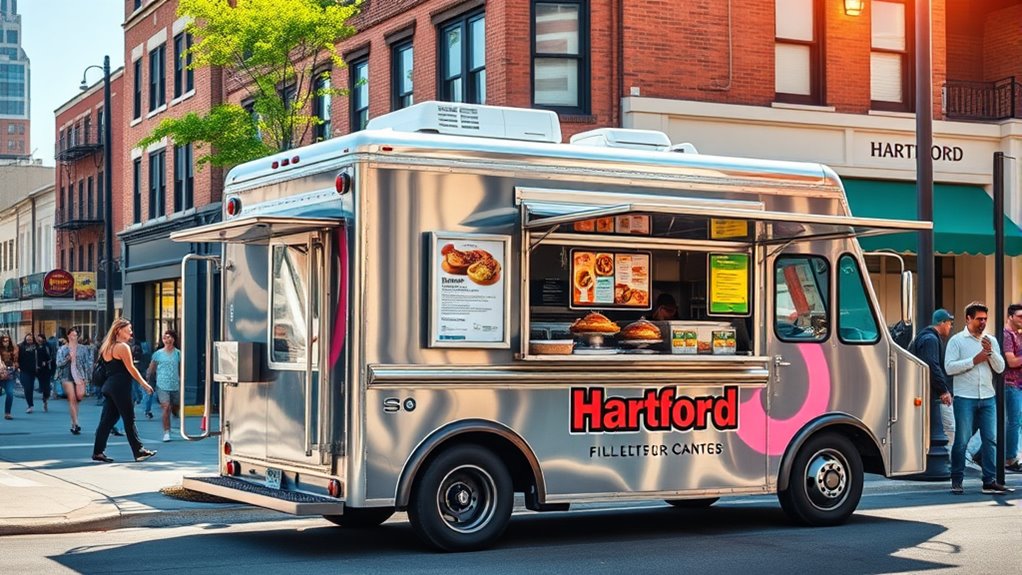
You can boost your food truck’s success by actively using social media platforms like Facebook to reach more customers and promote special offers. Participating in local events and partnering with nearby businesses increases visibility and builds community support. Leveraging these strategies helps create a strong presence that attracts repeat customers and drives sales. 80% of food trucks participate in at least 3 festivals or events annually to maximize exposure and connect with the community.
Leverage Social Media Platforms
How can a food truck maximize its visibility and customer engagement through social media? Focus on platforms like Instagram, Facebook, and Twitter, which suit food visuals and real-time updates. Use Instagram for mouth-watering photos and behind-the-scenes reels that attract food lovers. Leverage Facebook to promote events, share updates, and build community. Use Twitter for location updates, responding to customers, and engaging in local conversations. Post high-quality photos and videos consistently to keep your audience interested. Include location tags, hashtags, and branded tags to boost discoverability among local audiences. Run targeted ads and host contests to expand your reach. Finally, link your social accounts with online listings like Google My Business, Yelp, and food-specific apps for maximum exposure and easier customer access. Consistent engagement and timely responses on these platforms help foster trust and encourage repeat visits. Additionally, utilizing social media analytics can provide valuable insights into audience preferences and content performance, enabling you to refine your marketing strategies effectively.
Participate in Local Events
Participating in local events and festivals offers a powerful way to boost your food truck’s visibility and connect with the community. These gatherings attract diverse audiences, helping you build brand recognition and foster relationships. For example, Hartford Taste and the Riverfront Food Truck Festival draw families and food lovers, providing excellent exposure. To maximize benefits:
- Offer exclusive menu items or promotions to stand out during events
- Prepare for high-volume sales by managing logistics like ticket systems and regulations
- Engage with community causes, such as supporting charities like Connecticut Foodshare
- Events like Hartford Taste, a two-day street festival in Downtown Hartford, showcase Hartford’s vibrant culinary scene, attracting large crowds and media attention. Event participation Attending regional food battles and craft markets also helps boost your reputation and network with other vendors. By actively participating, you position your food truck as a local staple, increasing customer loyalty and sales.
Collaborate With Businesses
Partnering with local businesses like coffee shops and breweries offers a powerful way to boost your food truck’s visibility and expand your customer base. These collaborations enable cross-promotion, attract diverse audiences, and build community ties. Joint events and promotions create buzz, while shared marketing efforts reduce costs. You can also develop co-branded merchandise, like T-shirts or stickers, that promote both brands organically. Loyalty programs with nearby businesses encourage repeat visits across multiple locations. Additionally, co-hosted pop-up events or themed nights generate media attention and diversify your clientele. Using body awareness and somatic techniques can also help you better understand customer preferences and improve your service offerings. Use the table below to explore collaboration opportunities:
| Collaboration Type | Benefits | Examples |
|---|---|---|
| Cross-Promotions & Events | Broaden reach, community engagement | Co-hosted nights, festivals |
| Branded Merchandise | Increase brand awareness, revenue | T-shirts, hats, stickers |
| Loyalty & Referral Programs | Boost repeat business, data insights | Shared rewards, coupons |
Frequently Asked Questions
How Long Does the Permit Approval Process Typically Take in Hartford?
You’re probably wondering how long the permit approval process takes in Hartford. Typically, it takes about 2 to 4 weeks after you submit a complete application. Keep in mind, busy seasons can slow things down, and any delays in inspections or additional paperwork might extend the timeline. To avoid surprises, it’s best to apply early, make certain all your documents are thorough, and stay responsive during the review process.
Are There Any Restrictions on Operating Hours for Food Trucks?
You need to know that Hartford imposes specific operating hour restrictions on food trucks. Typically, you can operate between 7 a.m. and 9 p.m. on public streets, with some zones allowing until midnight. Operating beyond these hours requires special permits or approval, especially on public streets. Private property offers more flexibility, but you must still comply with noise and nuisance regulations. Always display your permits clearly during operating hours.
Can I Operate a Food Truck at Private Events Without City Permits?
You can operate a food truck at private events without city permits if you have the property owner’s permission. Hartford’s regulations don’t require city permits for private property events, but you still need to follow health and safety rules, including proper licensing, food safety standards, and waste management. Always confirm with the property owner and make certain you meet all health department requirements to serve food legally and safely.
What Insurance Coverage Is Required for Food Truck Operations?
Did you know that food trucks face an average insurance cost of $2,000 to $4,000 annually? For your operations, you must carry commercial auto insurance to cover accidents and liability, especially if your truck weighs over 10,001 pounds or transports hazardous materials. Additionally, general and product liability insurance protect against customer injuries and food-related claims. Workers’ compensation is mandatory if you employ staff, ensuring everyone stays protected.
Are There Specific Vehicle Size or Design Regulations for Hartford Food Trucks?
You’ll find Hartford doesn’t specify exact size limits for food trucks, but they do impose design and location rules. Your truck must fit within curb parking areas, avoid overhangs or external attachments, and not block sidewalks or traffic. It should be maneuverable enough to park at designated spots, stay clear of intersections and fire hydrants, and meet health and safety standards. Staying within these guidelines guarantees your truck complies with local regulations.
Conclusion
Think of launching your food truck as planting a seed. With the right permits, a well-chosen location, and a tasty menu, your business can grow strong and thrive. Just like a tree needs care and patience, your food truck requires attention to rules and community engagement. Stay dedicated, adapt as needed, and watch your venture blossom into a delicious success story in Hartford. With roots firmly planted, your food truck will flourish for years to come.
